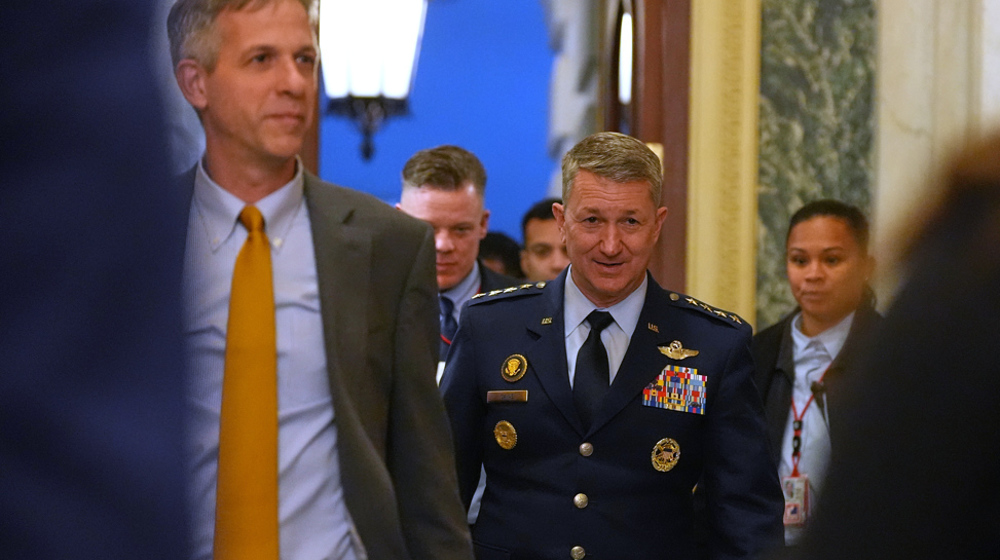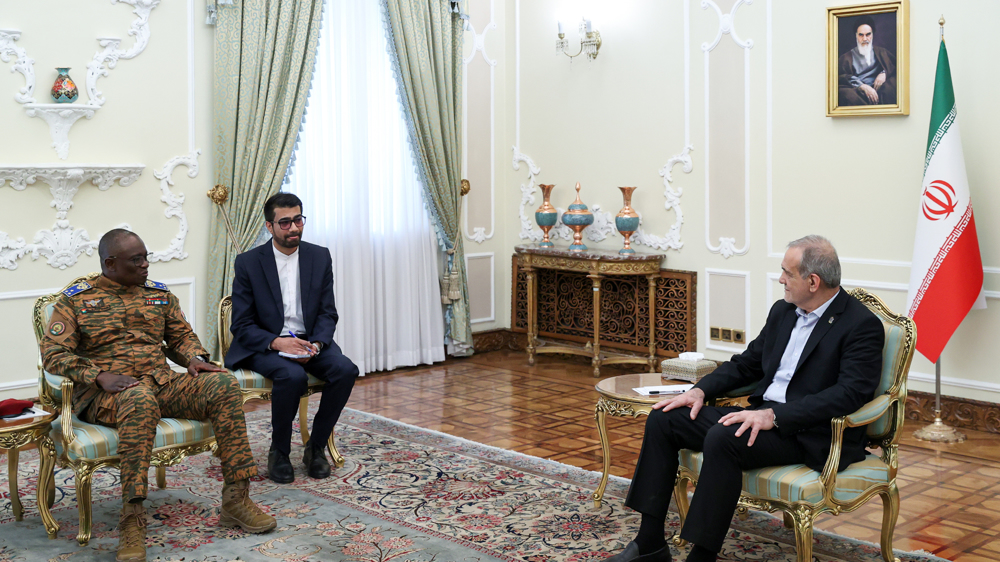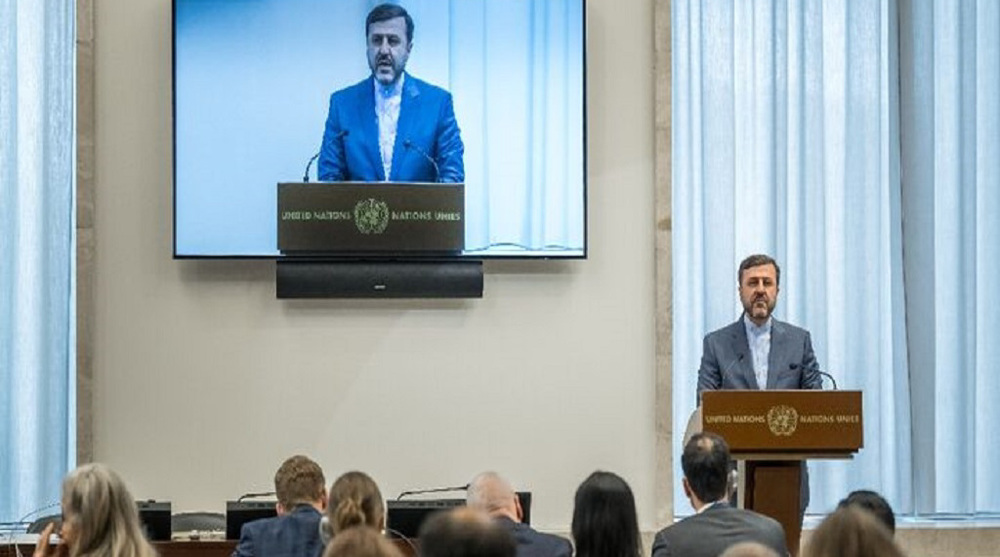Ayatollah Khamenei: US enmity with Iran deep, but all American plots have failed
Leader of the Islamic Revolution Ayatollah Seyyed Ali Khamenei says US enmity with Iran is deep but all American plots against the country have failed since the victory of the Islamic Revolution.
During a meeting with heads of the three branches of the Iranian government as well as officials in Tehran on Wednesday, Ayatollah Khamenei referred to what he called “the fundamental, deep and constant enmity” of the United States towards the Islamic Republic and said Iran would definitely defeat the US if Iranian officials fulfill their duty.
“From the beginning of the [victory of the Islamic] Revolution to the present day, the United States has carried out various types of hostilities to undermine the Islamic Republic and has organized various types of political, economic, military and propaganda activities against it,” the Leader said.

The United States has always done everything to “overthrow” the Islamic Republic, but it had been, and would be, defeated, he added.
“All of these measures were aimed at ‘subversion,’ and this word that is repeated is nothing new. All of these plots have failed… the Islamic Republic is moving forward after 40 years with various capabilities… We do not doubt the defeat of the enemy, and anyone who is familiar with Islamic teachings knows this,” the Leader stressed.
He noted that the current US president would meet the same fate as his predecessors, like George W. Bush, the neoconservatives and Ronald Reagan, and will be lost in history.
The Leader cited Iran’s experiences of US behavior over the years and said, “The first experience is that the government of the Islamic Republic cannot interact with America… Why? Because America is not committed to its promises."
Ayatollah Khamenei said that both the previous and current US administrations reneged on their promises in a way and threatened the Islamic Republic, adding that’s why Iran does not negotiate and interact with the US.
Ayatollah Khamenei said that the second experience was the deep animosity of the US towards Iran, adding that Iran’s nuclear program was not at the heart of US enmity towards the country but the Islamic establishment that has stood up to it, noting,” The United States wants to eliminate the components of power in the Islamic Republic.”
The Leader went on to say that history showed flexibility with enemies had made them bolder, stressing only resistance against the US would make it back down.
On relations with Europeans, the Leader said that Iran does not seek confrontation with Europe, but the UK, France and Germany showed that they will follow the US in sensitive issues.

The Leader also set out conditions for Tehran to stay in the nuclear deal with world powers, including steps by European banks to safeguard trade with Tehran after the US withdrawal from the agreement.
Ayatollah Khamenei added that European powers must protect Iranian oil sales from US pressure and continue buying Iranian crude, and must promise they would not seek new negotiations on Iran's missile program and regional activities.
"European banks should safeguard trade with the Islamic Republic. We do not want to start a fight with these three countries (France, Germany and Britain), but based on their past records, we don't trust them either,” he said.
"Europe should fully guarantee Iran’s oil sales. In case Americans can damage our oil sales..., Europeans should make up for that and buy Iranian oil," the Leader stated.
The Leader also said that "the Europeans must submit a resolution against the US at the UN Security Council to protest" Washington's withdrawal from the Joint Comprehensive Plan of Action (JCPOA).
He also called on the Atomic Energy Organization of Iran (AEOI) "to be ready" to restart nuclear activities "if necessary and in case the JCPOA proves to be useless."
"If the Europeans hesitate to respond to our demands, Iran reserves the right to restart its suspended nuclear activities," he added.
Ayatollah Khamenei’s remarks came two days after US Secretary of State Mike Pompeo threatened Iran with the toughest sanctions.
In his first major foreign policy address since moving to the State Department from the CIA, Pompeo said on Monday that Washington would increase the financial pressure on Iran by imposing the "strongest sanctions in history" on the Islamic Republic if Tehran refused to change the course of its foreign and domestic policy.
Pompeo also outlined 12 US demands for Iran, including halting its uranium enrichment and closing its heavy water reactor, for any "new deal" with Tehran.
He spoke two weeks after President Donald Trump pulled the US out of the Iran nuclear deal that had lifted sanctions on Iran in exchange for restrictions on its nuclear program.
Trump announced on May 8 that Washington was walking away from the nuclear agreement, which was reached between Iran and the five permanent members of the UN Security Council -- the US, Britain, France, Russia and China -- plus Germany – in 2015.
He also said he would reinstate US nuclear sanctions on Iran and impose "the highest level" of economic bans on the Islamic Republic.
The engineering feat behind Iran’s record gas output
VIDEO | Press TV's news headlines
Freedom of speech, right to protest under assault in UK
Border guards seize cache of weapons, ammunition near Iran-Afghanistan border
Grok to power classified programs as Musk's xAI secures deal with Pentagon
Iraqi FM tells US envoy: Government formation ‘internal matter’
Israel killed Gaza aid workers in ‘execution style’ massacre in 2025: Report
Participation shrinks at Israeli arms expo in wake of Gaza genocide: Report














 This makes it easy to access the Press TV website
This makes it easy to access the Press TV website